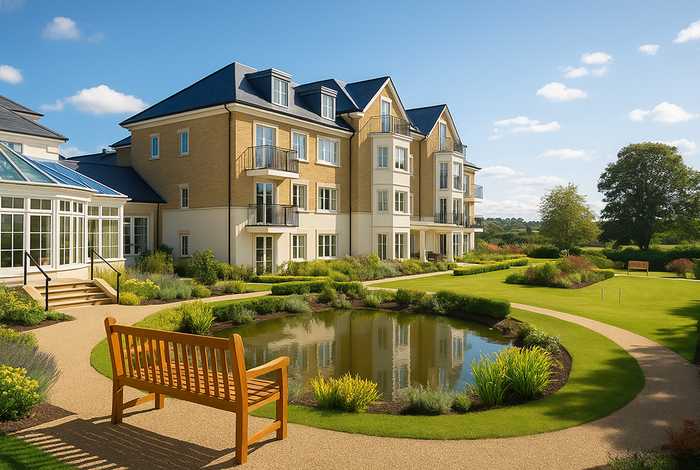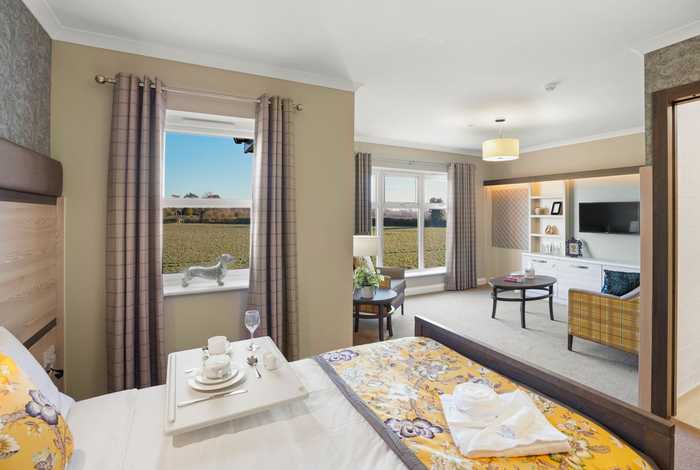Posted by Janine Griffiths
What are the different types of care homes

Choosing a care home isn’t just about ticking boxes or matching a checklist. It’s about finding the right environment that truly feels like home—a place where comfort, support, and dignity go hand in hand.
Yet, when people start their search, they’re often met with a maze of labels: residential care, nursing care, dementia care… But what do these terms really mean in everyday life? And more importantly, how do you find a care setting that fits the unique needs and personality of you or your loved one?
In our previous blog ‘What are the main types of care home for the elderly?’ we discussed the differences between the main categories of care homes, which include residential, nursing, respite and dementia care homes.
However, the truth is, today’s care homes are evolving. It’s no longer just about ‘types’—it’s also about lifestyle, support levels, and personal choice. In this guide, we’ll break down the different types of care home in a way that makes sense—not just by category, but by what truly matters: quality of life, independence, and peace of mind.
Beyond the labels
Care homes are often thought of as a last resort—places where people go when they have no other choice. But that couldn’t be further from the truth. Today’s care options are as diverse as the people who need them, designed to support different needs.
Why care homes aren’t one-size-fits-all
No two people age the same way, so why should all care homes be the same? Some provide an active, community-driven environment where residents can enjoy hobbies and social events. Others offer palliative or end-of-life care for those with complex health needs, while others are care homes especially designed for those with mental health challenges. Regardless of the different types of care homes, tailored support can make a world of difference. The key is finding a home that feels like home—one that matches individual needs, not just a broad category.
How modern care options cater to different needs
The days of rigid, institutional care are fading. Today’s care homes are built around choice, comfort, and dignity. Many now offer private apartments with hotel-style amenities, giving residents independence with the reassurance of support when needed. Some even specialise in short-term stays, allowing families to try out care before making a long-term decision. With so many options available, choosing care is no longer about compromise—it’s about finding the best fit.
Busting common myths about care homes
However, despite the diversity and evolution of care homes, some harmful myths about different types of care homes still exist. This can result in many people feeling anxious and reluctant to seek the support they need. In this section, we address some of the common stereotypes about care homes. So let’s set the record straight:
- Myth: Care homes mean losing independence.
- Reality: Many offer flexible support, allowing residents to stay as independent as possible.
- Myth: They all feel clinical and impersonal.
- Reality: Modern care homes are warm, welcoming spaces with a strong sense of community.
- Myth: Care is only for those in crisis.
- Reality: Many people choose care homes proactively, enjoying a safer, more social lifestyle before they ever need medical support.
Different types of care home based on care given
When it comes to care homes, it’s easy to get lost in the jargon. But behind every term is something far more important—real people with real needs, each requiring the right level of support to live with dignity, comfort, and purpose.
Care isn’t just about a place to stay. It’s about getting the right help at the right time, whether that’s recovering from an illness, managing a lifelong condition, or simply having a safe space to rest. Here’s a breakdown of the different types of care homes based on the support they provide.
Complex care
Complex care is for those living with severe disabilities, long-term conditions, or advanced neurological disorders. They offer specialist, person-centred round-the-clock support from trained professionals. These homes cater to people who need ventilator support, tracheostomy care, or rehabilitation after life-changing injuries. It’s not just about survival—it’s about maximising quality of life, even in the most challenging circumstances.
Complex care is sometimes also known as long-term care or continuing care.
Convalescent care
After surgery, a hospital stay, or a serious illness, going straight home can feel overwhelming. Convalescent care provides a bridge between hospital and home, offering medical supervision, physiotherapy, and a chance to regain strength without the pressure of managing alone. It’s like a safety net, ensuring people heal properly before resuming their daily lives.
Check out our blog to learn more about convalescent care and the type of support it provides.
Palliative/End-of-life care
Facing terminal illness or the final stages of life is never easy, but the right care home can make all the difference. Both palliative and end-of-life care focuses on pain management, emotional support, and ensuring every moment is as comfortable and meaningful as possible. With this type of care, families are encouraged to be involved, and residents are treated with deep compassion, ensuring they pass with dignity, peace, and respect.
Daily respite care
Caring for a loved one is rewarding, but it’s also demanding. Daily respite care offers temporary stays, giving family caregivers a well-deserved break while ensuring their loved one receives high-quality care in a safe, social environment. Whether it’s for a day, a weekend, or longer, respite care supports both the carer and the person receiving care, reducing burnout and improving overall wellbeing.
Mental health care
While there are many different types of care home, mental health care homes are uniquely equipped to handle the needs of individuals with long-term mental health conditions such as schizophrenia, bipolar disorder, or severe anxiety. These homes provide therapeutic support, structured routines, and a nurturing environment aimed at rebuilding confidence and encouraging independence.
These settings offer a path towards stability through counselling, medication management, and social activities.
Many residential care and nursing homes provide a basic level of support for mental health conditions, but mental health care homes will often have resources, amenities and staff that are specially trained to deal with a range of mental health conditions.
The purpose of these homes is to provide sensitive and person-centred care for people affected by a range of conditions, in addition to providing the support and care that they need.
High dependency care
High dependency care homes are also more commonly known as nursing homes which specialise in looking after individuals who require constant supervision due to severe mobility issues, advanced dementia, or multiple health complications.
These types of care homes provide intensive, round-the-clock assistance, ensuring that even those with the most complex needs receive the attention, dignity, and medical expertise they deserve.
Preventative care
Care isn’t just about responding to illness or frailty—it’s also about preventing it. Preventative care focuses on maintaining independence, improving overall well-being, and reducing the risk of future health complications. By addressing potential issues early, individuals can stay healthier for longer, delaying or even avoiding the need for more intensive care.
Preventative care can take many forms. Health and mobility support, such as physiotherapy and structured exercise programs, helps individuals maintain strength and reduce the risk of falls. Nutritional guidance ensures a balanced diet, preventing malnutrition and boosting overall health. Cognitive stimulation through activities like memory games, puzzles, and social interaction can help delay cognitive decline and reduce the risk of dementia.
Finding the right fit
Care homes aren’t just places where people live—they’re places where people heal, grow, and thrive. Understanding the different types of care home available means making an informed, confident choice that suits not only medical needs but also emotional wellbeing and lifestyle preferences.
No matter the level of care required, the right home is out there—one that offers more than just a service, but a genuine sense of belonging and support.
Looking for care homes for yourself or a loved one?
If you are actively exploring different types of care homes for yourself or a loved one, Autumna can help. Simply visit our comprehensive directory, enter your location, and you'll instantly receive a list of care homes near you.
For an even more tailored experience, use our shortlisting tool to refine your search and find care homes that meet your unique needs and preferences.
If you’d prefer personal assistance, our team of friendly and knowledgeable experts are here to help. Call us today at 01892 335 330 for support in making the right choice for you or your loved one.
Receive a Free Care Home Shortlist!
Let our expert team of advisers get your search off to a great start.
Tell us a little about your needs and we'll send you a bespoke shortlist of care homes! Click the button below to begin, it takes just a few minutes.
Other articles to read
From the blog

Older Persons Care Advice
Guide to rural retirement villages in the South
April 25th, 2025
Discover the peace of rural retirement villages in the South of England. Explore options that balance independence, support, and countryside charm.

Older Persons Care Advice
Ultimate guide to care homes in Norwich
April 23rd, 2025
Discover the best care homes in Norwich—explore lifestyle-focused options, top-rated services, and how to choose the right home with confidence.

Older Persons Care Advice
How to find an adult day care centre near you
April 22nd, 2025
Looking for an adult day care centre near you? Discover how to find safe, joyful care for your loved one—and support for yourself—on Autumna.
Frequently Asked Questions
Care homes vary from residential to nursing care, offering services like complex care, mental health support, convalescent care, and more, each catering to unique needs.
Autumna’s directory and shortlisting tool can help you find care homes based on your location, needs, and preferences, ensuring you choose the right fit.
Yes! Visiting potential care homes is a great way to get a feel for the environment and ensure it aligns with your expectations and requirements.
Residential care provides assistance with daily activities and personal care, while nursing care offers medical support from qualified nurses for those with more complex health needs.
The UK's largest & most detailed directory of elderly care and retirement living options
10,417
Care Homes
12,409
Home Care Services
1,671
Live-in Care Services
1,826
Retirement Living Developments
Autumna is the UK's largest and most comprehensive later-life living & elderly care directory. Our detailed search facility and team of expert advisors can help you find the best care homes, nursing homes, retirement homes, retirement villages, home care, and live-in care services for you or your loved one's needs. Our website is free to use, we are proudly independent, and we never take referral fees.






